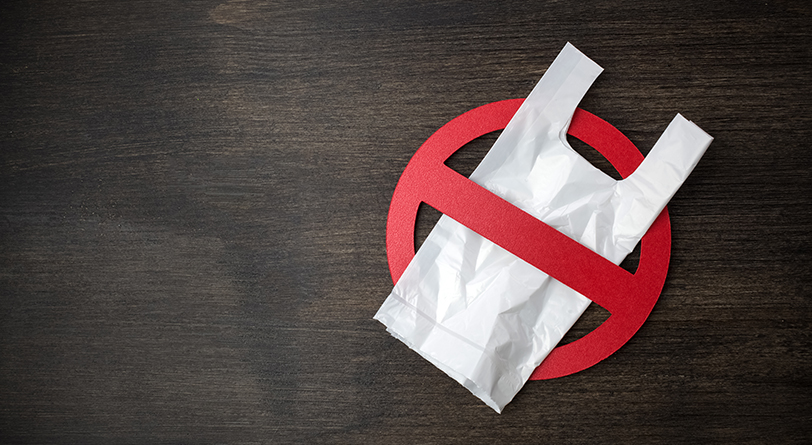California Pursues Actions Against Plastics
Double Whammy: Bag Ban and Lawsuit Against ExxonMobil

In two separate actions in September, California moved to ban single-use plastic bags at grocery stores and sued ExxonMobil over its claims about the recyclability of plastics.
Bag Ban in Place
The ban on plastic bags at grocery stores was signed by Gov. Gavin Newsom 10 years after an initial ban on single-use bags. That original ban disallowed thin bags but allowed stores to use thicker plastic bags that could be reused. However, consumers would throw those away, creating even more waste than with the flimsier bags, according to a new release from the state.
The new ban addressed that issue, says Democratic state Sen. Catherine Blakespear, who was one of the sponsors of the new legislation.
“Instead of being asked, ‘Do you want paper or plastic?’ at checkout, consumers will simply be asked if they want a paper bag if they haven’t brought a reusable bag,” Blakespear said in a statement. “This straightforward approach is easy to follow and will help dramatically reduce plastic bag pollution.”
Whether the move is overall positive for the environment is up for debate due to paper bags requiring more energy and resources to manufacture and transport than plastic bags, which can result in a larger carbon footprint.
Lauren Aguilar, a lobbyist at Serlin Haley LLP that represents the Flexible Packaging Association (FPA), did not comment directly on the ban but questioned whether store drop-off programs for plastic bags established during the original proposal would still be needed.
Over the years, FPA has opposed bans, arguing that they often lead to unintended consequences.
For example, the amount of grocery and merchandise bags disposed of by Californians grew from 157,385 tons of plastic bags the year California passed the bag ban to 231,072 tons by 2022—a 47% increase, according to the state’s news release that cited statistics from CalRecycle.
California Sues ExxonMobil
In a separate legal action in September, California Attorney General Rob Bonta sued ExxonMobil for alleged deception about plastics recycling.
Public statements and marketing from the company promised that recycling would address the increasing amount of plastic waste, according to a statement from Bonta’s office. Through the lawsuit, the attorney general seeks to compel ExxonMobil “to end its deceptive practices that threaten the environment and the public.”
Bonta says he is seeking an abatement fund and unspecified civil penalties.
He also claims that ExxonMobil falsely promoted plastics as recyclable when most plastic products cannot be recycled “either technically or economically.”
In addition, he claims that the company deceived the public by touting advanced recycling.
“‘Advanced recycling’—also known as ‘chemical recycling’—is an umbrella term used by the plastics industry to describe a variety of heat or solvent-based technologies that can theoretically convert certain types of plastic waste into petrochemical feedstock, which can be used to make new plastic,” according to the statement.
“Under its advanced recycling program, ExxonMobil uses heat to break down plastic waste. ExxonMobil promotes its advanced recycling program as a breakthrough in technology that will make plastics sustainable but hides important truths about its technical limitations.”
The statement says those limitations include that plastic processed through advanced recycling does not become plastic but fuels. And that the process cannot handle large amounts of post-consumer waste.
Lauren Knight, a spokesperson for ExxonMobil, says in a statement that California officials have known their recycling system isn’t effective for decades.
“They failed to act, and now they seek to blame others,” she said. “Instead of suing us, they could have worked with us to fix the problem and keep plastic out of landfills. The first step would be to acknowledge what their counterparts across the U.S. know: advanced recycling works.
“To date, we’ve processed more than 60 million pounds of plastic waste into usable raw materials, keeping it out of landfills. We’re bringing real solutions—recycling plastic waste that couldn’t be recycled by traditional methods.”
Thomas A. Barstow is senior editor of FlexPack VOICE®.


